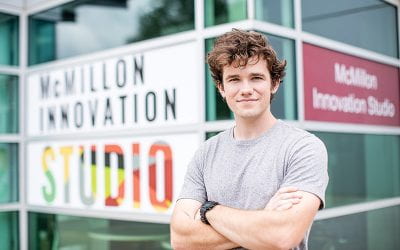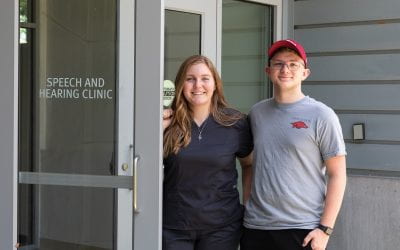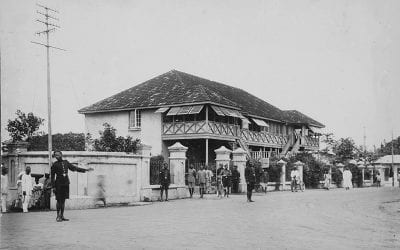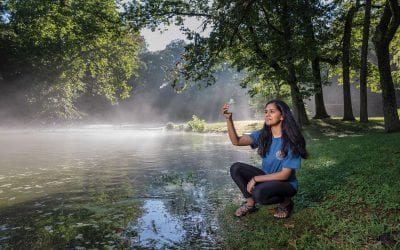Linking Fate + Future
By Katie Wilson Powell
Photos courtesy of Russell Cothren
When it comes to politics, what impacts your opinions? When you fill out your race or ethnicity on the census, do you struggle with which box to check? These are key questions that Esmeralda Verdin Gomez hoped to answer in her honors thesis, which explored “linked fate,” the concept of foregrounding race over one’s own self-interest. More specifically Verdin Gomez, a political science and sociology major and Honors College Fellow from DeQueen, Arkansas, decided to examine why multiracial Latinos in America identify the way they do, and if these identities translate into a sense of linked fate.
Verdin Gomez was one of the first students to participate in the Honors College First-Generation Mentoring Program. “I guess it all started when I was assigned a first-gen mentor, Dr. Medina Vidal in the political science department,” she said. She decided to enroll in his courses when their discussions sparked an interest in Latino politics. “I’m Latina, but I didn’t really know what that meant, even though it was part of my identity,” she explained. Though the U.S. Census classifies “Latino” as an ethnicity, many people also consider it their race. “The inherent diversity in the Latino term means that racial/ethnicity solidarity is far more complex for Latinos than other racial groups,” Verdin Gomez argued.
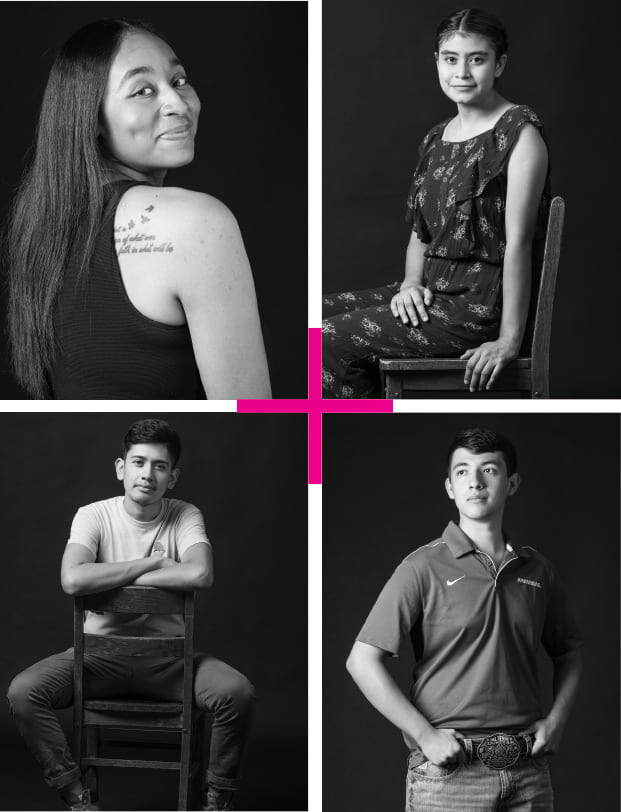
Note: Individuals pictured did not participate in Verdin Gomez’ study.
Linked fate was first proven in African American political behavior, which expands beyond voting patterns to include opinions on issues like immigration and social programs, and the development of a united political front related to race. Verdin Gomez began to explore quantitative data collected by other researchers but found these to be lacking. Though the data sets explored class, gender and a presence of linked fate in other racial groups, there was little to no research on multiracial individuals. This inspired her to consider a “deeper dive” via interviews in order to better understand how race plays into the political decisions of multiracial Latinos.
“I knew interviews would be more limited in scope but this way I could actually ask questions that help me answer what I hope to investigate” she said. Her next hurdle came in recruiting participants. Verdin Gomez ultimately interviewed five multiracial Latinos who identified, for example, as multiracial Mexican, Egyptian, and Brazilian. Her questions centered on the impact of participants identifying as multiracial and sought to clarify how much they felt that their race impacted their future.
Overall, Verdin Gomez identified four themes related to their racial/ethnic identity: feeling like an outsider, racial/ethnic ambiguity, encounters with racism, and a multiracial advantage. Participants expressed that they didn’t feel they were “enough” — they weren’t “white enough,” “Latino enough,” “Black enough,” and always struggled by feeling as if they were “in between.” They also shared with Verdin Gomez that people and groups they interacted with were confused about their race and even citizenship, which led to feelings of isolation. All participants recalled instances of overt and covert racism and described the unique challenges that come with living and learning in a majority-white town. However, all participants felt that their multiracial identities offered them protection from the more blatant discrimination and profiling they see experienced by their monoracial family and friends.
Ultimately, Verdin Gomez found that there was no instance of linked fate among multiracial Latinos. The reason for this, she believes, is that almost all of her participants identified more as mixed race instead of specifically multiracial Latinos. The very title of her thesis, “What are you?” points to participants’ own discomfort in being confronted with questions of their racial identity, making them feel as if they don’t belong. “We need to come up with new theories and forms of measuring political identity, because we live in a vastly different world than we did when these tools were first developed,” she said. As evidence, Verdin Gomez points to the recent census, which does not provide appropriate options in regards to race and ethnicity. “There needs to be more exploration into how people identify,” she said. “There’s definitely a discrepancy between the forms and people’s reality, which also showed up in my study.” Xavier Medina Vidal, Verdin Gomez’s thesis advisor, said that, “Esmeralda’s brilliant execution of mixed methods achieves much more than a set of interviews or a regression analysis alone can accomplish. Her thesis most certainly stands to make a significant contribution to knowledge about the political behavior and orientations of multiracial Latinos.”
Verdin Gomez was awarded the Faculty Scholars Award at the Pepperdine Caruso School of Law, which provides full tuition as well as a stipend. Though she has not chosen a specialization, she hopes to serve as a public interest lawyer, either working with immigrants, children or combining the two to work with unaccompanied minors. “I know I’ll not get paid a lot, but I’ll have a really fulfilling job in the future,” she said. Her potential career puts Esmeralda’s Latina identity ahead of her own personal gain, showing her own sense of linked fate as a student today and in years to come.
More Field Notes
Driving Innovation
Nick Foster, Lauren Horne, Colby Reed and Robbie Prettyman examine the prototype for a laser lighting system in the McMillon Innovation Studio.By Kendall CurleePhotos courtesy of Philip ThomasTruck drivers keep our economy moving and currently, they’re in short...
Band Aid
By Hiba TahirPhotos courtesy of Russell Cothren Emily Myers, a trumpet player in the Razorback Marching Band, looked around during a high school warm-up one day years ago to discover that — despite an alarmingly high decibel level that “maxed out” an app she used to...
Exploring National Identity By Design
By Brock DeMark Photos courtesy of Jim Tschetter/IC360 Images and Russell CothrenHonors architecture major Anna Ibru grew up in Lagos, Nigeria, in a neighborhood graced by many colonial-era bungalows on expansive lots. “My whole life revolved around buildings like...
Probing Pollution at Lake Keith
By Samantha Kirby Photos courtesy of Russell Cothren and Chieko Hara If you’ve ever traveled along Highway 112 to Northwest Arkansas National Airport, you’ve likely passed Lake Keith on your way through Cave Springs. But you can’t be faulted for not noticing: On...
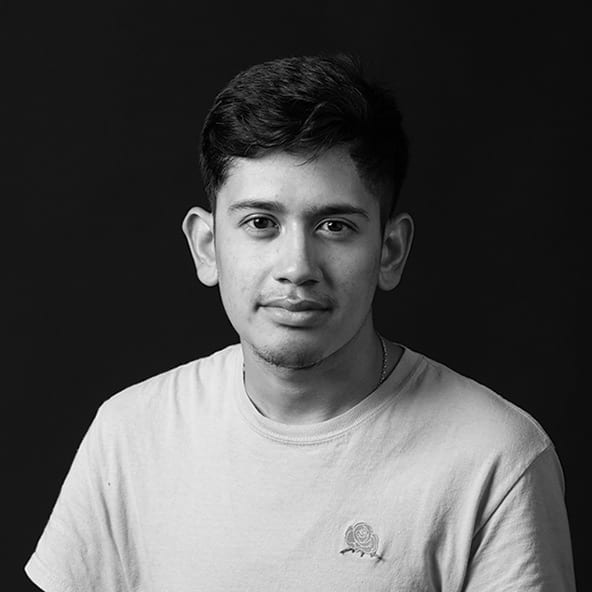
Anthony Sysoukrath
Laotian/Salvadoran
My Laotian grandparents played a huge part in my upbringing, which is why I experienced three-day birthday parties, eating tom gai and Lao beef jerky for breakfast and not quinceañeras and pupusas. I have only ever been to two or three quinceañeras in my life as opposed to the countless number of “Lao New Year” parades I have had the opportunity to experience.
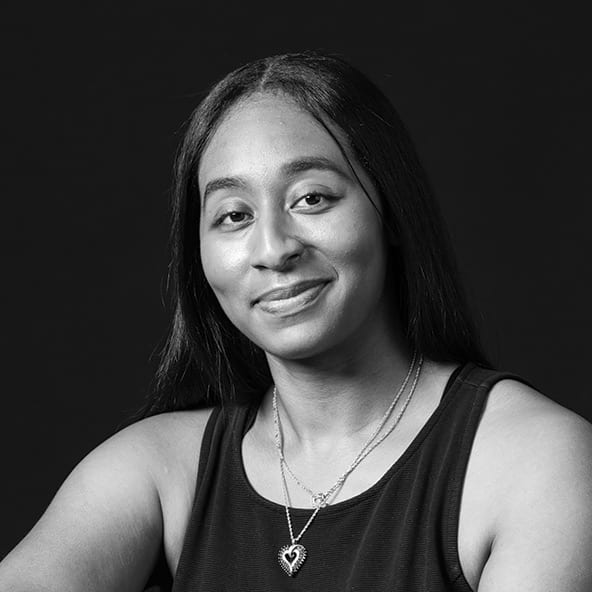
Michelle King
Black/Panamanian
I feel a stronger sense with my Black identity because that is the one I had more exposure to over my lifespan. I have always been told (by my grandmother) that I have Panamanian blood running through my veins and that one would swear that I grew up there just by how good I am with dancing to Spanish music amongst other things. But then I meet others who are more Latino than I am and sometimes feel displaced.
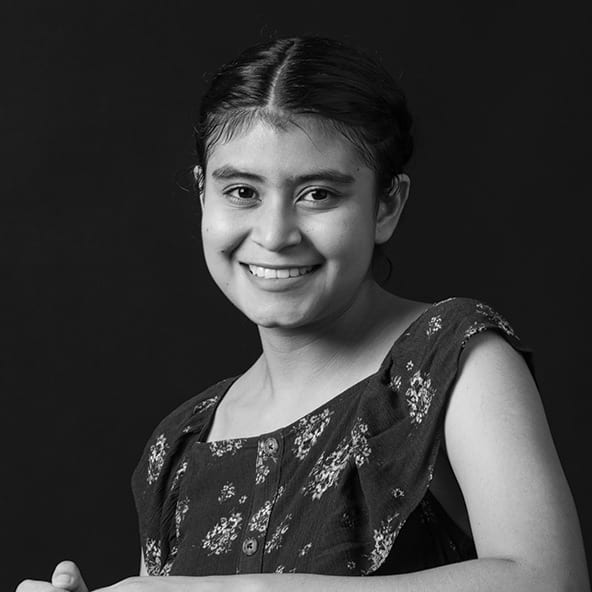
Tatiana Castillo Hernandez
Panamanian/Amerindian
A couple of months ago I took an ancestry test to decipher my multiracial Latino identity once and for all. Now, I know that I am composed of several ethnicities, the most predominant being Native American. I can say I have a little bit from everywhere and it makes me feel so proud of each group I have genes from. It is a marvelous mixture and I feel so happy to know that.
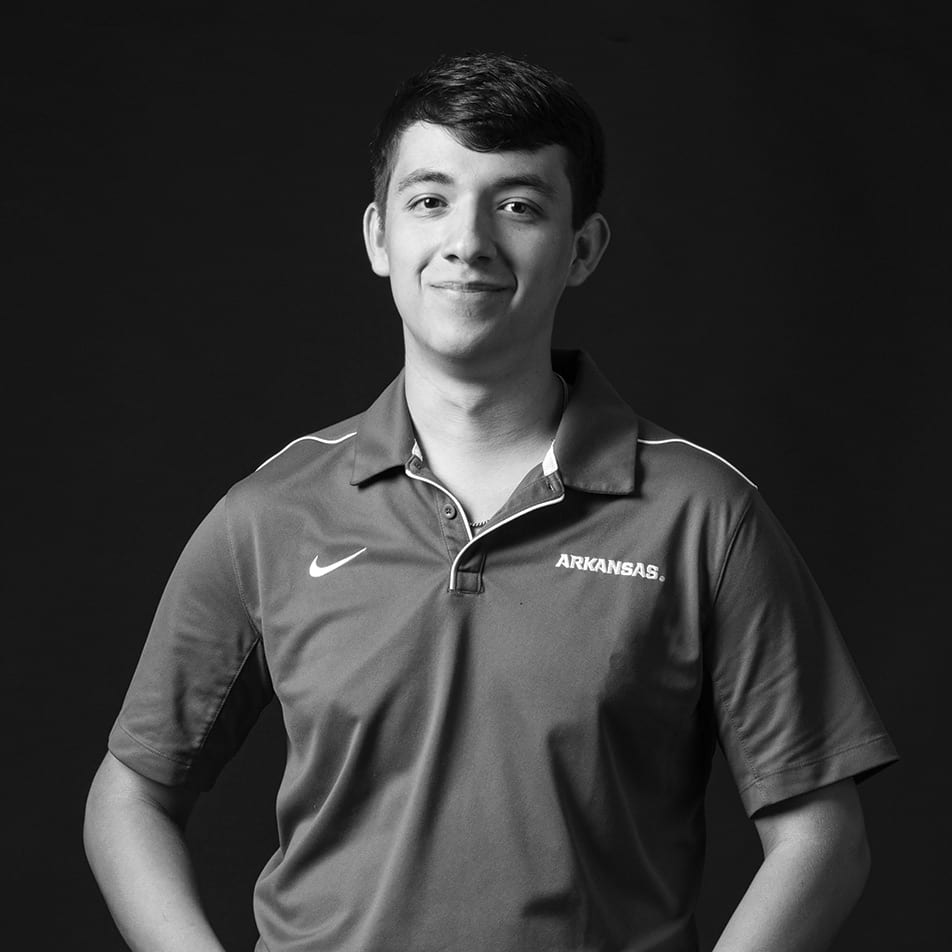
Isaac Diaz
Mexican/Spanish/Greek
My dad is descended from Aztecs and Mayans — he’s from Mexico. My mom is Spanish and Greek. I feel a stronger tie to my Mexican identity because of the location of my hometown — Del Rio, Texas — and cultural exposure and practices.


